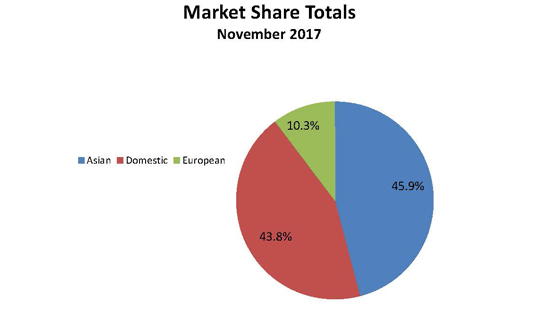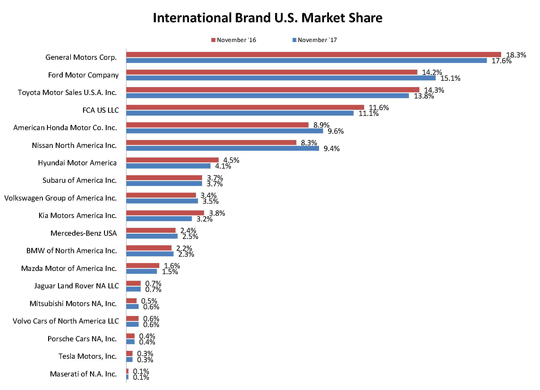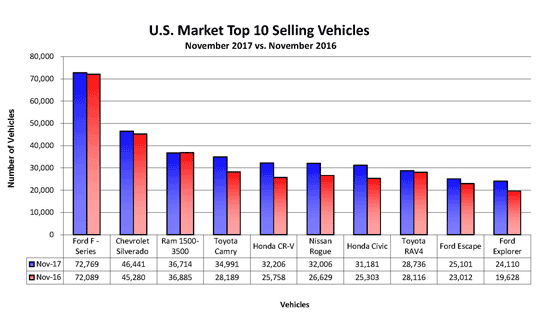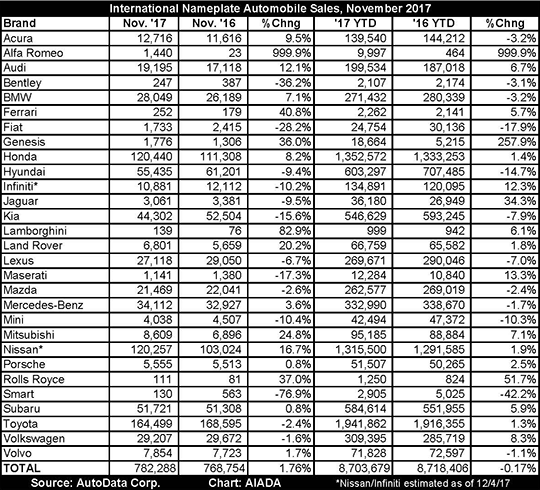US Auto Sales Scoreboard - November 2017
Washington DC December 4, 2017; The AIADA reported that despite a slowing U.S. auto market in November that appears on pace to log the first decline since the great recession, international auto brands continued to lead among U.S. car shoppers. International brands were led last month by Honda (up 8.2 percent from last November, a brand record for the month), Mercedes-Benz (up 3.6 percent), and Mitsubishi (up 24.8 percent). Most sales improvements were driven by light truck purchases, which rose 6.6 percent as a segment from last November, while cars continued to lag, down 8.2 percent from a year ago.
“International nameplate brands continue to perform well in today’s market,” said AIADA President Cody Lusk. “Demand is steady, and dealers are in a position to end the year on solid footing and begin 2018 with a competitive edge.”
International Brands Lead U.S. Market Heading Into December
International nameplate brands captured 56.2 percent of the November auto market, an increase over their October market share of 55.3 percent and November 2016 when they held 55.7 percent. Overall, they sold 782,288 vehicles, down from 748,614 vehicles last month, but up from November 2016 when they sold 768,754 vehicles.
Asian brands captured a 45.9 percent share of the market in November, up from 45.6 percent in October and 45.7 percent in November 2016. Sales totals of 639,223 vehicles for the month were a dip from the 708,049 vehicles they sold in November, but up from 630,961 vehicles in November 2016. For the year-to-date heading into December, Asian brand U.S. sales were down by 0.6 percent.
European brands finished the month on a high note, occupying 10.3 percent of the U.S. auto market – up from 9.6 percent in October and 10 percent in November 2016. They sold 143,065 vehicles, up from 130,171 in October and 137,793 last November. For the year overall, sales for European brands are up 2.2 percent.
Domestic brands finished November with 43.8 percent of the U.S. auto market, down from 44.7 percent last month and 44.3 percent last November. They sold 610,722 vehicles for the month, up from 606,261 in October, but down slightly from 611,804 vehicles sold in November 2016. Sales for the year-to-date are down 3.1 percent for domestic brands.
Trucks, SUVs Dominate with U.S. Shoppers in November
Eight of the month’s top ten selling vehicles fell into the truck or SUV category. The Ford F-Series, Chevrolet Silverado, and Ram pickups led the field with the top three spots, respectively. The Honda CR-V saw a sales leap of 25 percent over November 2016 to capture the title of the month’s top-selling SUV. It was followed by the Nissan Rogue in sixth place, the Toyota RAV4 in eighth, the Ford Escape in ninth, and the Ford Explorer in tenth place.
The Toyota Camry saw sales improve by 24.1 percent to finish the month in fourth place overall as the top-selling car in the U.S. In seventh place, the Honda Civic was the only other car to make November’s top-ten list.
North American Manufacturing Powers U.S. Auto Market
North American manufacturing units operated by international brands supplied 491,049 vehicles to American dealer lots in November. The figure was an increase over October, when they supplied 470,948 vehicles and included 216,279 Asian cars, 233,746 Asian trucks, 17,127 cars, and 23,897 trucks.
Outlook
AutoData Corp. reports that the seasonally adjusted annual rate (SAAR) for November was 17.48 million units versus 17.71 million units a year ago. Total industry unit deliveries, including domestic brands and unadjusted for business days, increased nearly one percent compared to last November. International brands as a group slightly outperformed the whole, rising 1.76 percent. Sales for all brands were down 1.5 percent year to date, increasing the likelihood that 2017 will mark the first year since the Great Recession that auto sales did not grow. These numbers include an estimate of sales for the Nissan and Infiniti brands, which were prevented from reporting November figures by a systems glitch.








